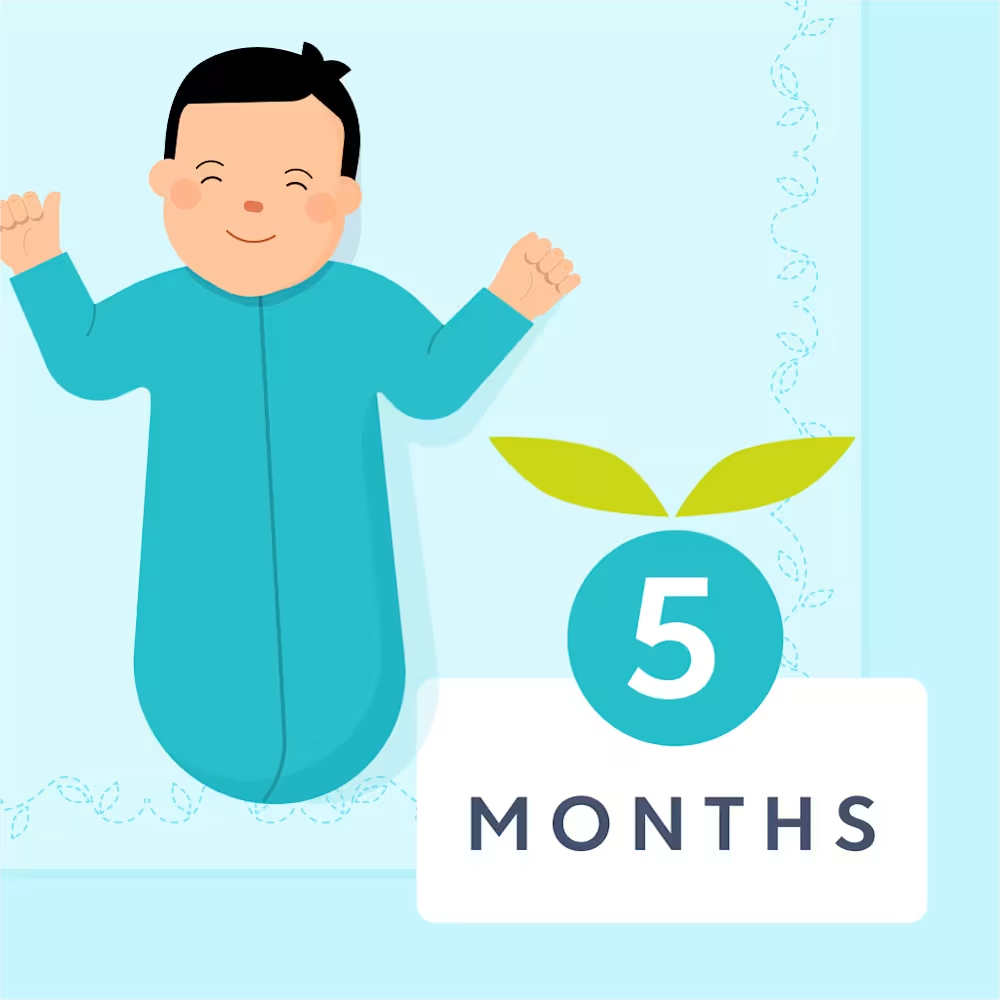7 - 8 month old baby feeding schedule: Food chart, formula & breastmilk
Updated Feb 13, 2026

Whew! Is feeding your little explorer at 7 - 8 months starting to feel like a full-time job? It may feel, between those ever-important bottles or nursing sessions and a growing number of solid food adventures, that feeding time is taking over your daily calendar.
But here's the amazing part: those busy days are packed with discovery! Your little one is , diving face-first (sometimes literally!) into new textures and tastes.
Let’s keep that messy, wonderful journey going. We've got the full playbook right here on everything you need to know about feeding your incredible 7-8 month old baby.
7 - 8 month old baby sample feeding schedule
Ready for a peek at what a busy day of eating might look like? The sample schedule below is designed to be a helpful guide — a gentle point for planning your little one's feeding flow. But remember, your baby didn't get the memo! Every small human has different needs, and those needs will likely shift (sometimes daily!) over the course of these two big months. Always do what’s best for your baby and your family.
Time of day | Meal type |
6:30 AM | Breast milk or formula |
9:30 AM | Breast milk or formula Solid meal |
1:30 PM | Breast milk or formula |
4:30 PM | Breast milk or formula |
6:30 PM | Breast milk or formula Solid meal |
11:00 PM | Optional dream feed |
How much to feed a 7 - 8 month old: Food chart
The majority of nutrition still comes through breast milk and/or formula for 7 to 8 month old babies, though they will continue exploring solid food more and more. Consider breast milk and/or formula their primary food source, whereas a greater adventure comes with solids. Here is what you can expect when it comes to prioritizing those essential milk feeds:
Aiming for about 6 - 8 oz of breast milk and/or formula per feed
Offering feeds every 4 - 6 hours throughout the day
Totaling 24 - 32 oz of breast milk and/or formula each day
Nursing or eating a bottle about 30 minutes before solid food meals
Continuing to feed on demand
At this age, eating solids builds vital skills like chewing, grasping, swallowing, and expanding their palate []. In practice, this looks like:
Including one or two solid food meals per day in addition to breast milk or bottles.
Using , solid foods, or a combination of both
It’s common for families to offer a combination of purees and finger foods rather than strictly adhere to just one style of feeding. This gives your tiny food critic the ability to critique more tastes and textures! This exposure to various tastes and textures is highly recommended by the AAP [].
7 - 8 month feeding chart example for baby-led weaning

7 - 8 month feeding chart example for purees

Does my baby need water?
At this age, breast milk and/or formula do the heavy lifting when it comes to hydration. While not required, introducing water at this age can be beneficial in helping babies learn to accept the taste and develop cup drinking skills. You can start offering small sips of water with meals in an open, straw, or sippy cup. Just a few ounces a day is plenty for now [].
Night feedings at 7 - 8 month olds
At 7 - 8 months of age, many babies can sleep for , especially if they’ve developed strong and are eating enough calories throughout the day. However, some babies sleep better with a night feeding, typically a dream feed or an early morning feed around 3:00 - 5:00 AM. There’s no need to wake your baby to feed at this age unless you’ve been told otherwise by your pediatrician.
Common feeding challenges for 7 - 8 month olds
No matter how much we might prepare or plan, sometimes feeding feels more like a bumpy roller coaster ride. Don’t worry! A few common hiccups may pop up as your baby gets older, more mobile, and opinionated about what's going into their mouth. Here are some of the frequent feeding challenges you might encounter between 7 - 8 months:
Refusing solids or milk
Increased mobility
High distractions
Food throwing
Taste or texture aversions
At 7 – 8 months, babies are little explorers with big opinions, and their developing skills directly impact feeding time. You might find your little one trying to practice their crawling or standing while nursing or taking a bottle, or maybe they’re turning their head sharply away from a spoon because the cat walked by. It's also normal for them to develop an aversion to a texture they used to love or flat-out reject a new solid, which often results in the famous food-throwing protest. Keep calm and remember these are usually just temporary phases!
5 tips for feeding your 7 - 8 month old baby
Feeding tip | Notes |
|---|---|
Create space for mealtime | Create a space for your baby at the table and gather all needed supplies (cups etc.) to help you feel more organized at mealtimes. |
Explore flavors and textures | Offer a variety of flavors and textures, letting your baby touch and play with food. Don’t worry if they don’t like something right away. |
Formula and breast milk take priority | Continue formula or breast milk as the main source of nutrition. Offer solids about 30 - 60 minutes after milk feeds to ensure your baby still gets what they need while exploring new foods. |
Enjoy eating together | Eat with your little one and model healthy habits. Keep distractions away so your baby can focus and learn from watching you. |
It’s OK to be messy | Expect and embrace the mess — exploring with their hands helps babies learn and makes them more likely to try new foods and avoid feeding challenges later on. |
Tip #1: Create space for mealtime
Setting up a space to dedicate to your baby’s mealtimes will set you up for success! Place their highchair or booster seat at or near the family table and gather all supplies needed (cups, utensils, etc.) in one spot. Being organized may make mealtime feel easier.
Tip #2: Explore flavors and textures
Babies at this age really are more open to exploring a wide variety of flavors and textures. So, as much as you are able, introduce them to new foods and foods prepared in different ways.
Allow them to explore foods with their hands and remember they may not “like” a food the first time or two they try it.
Tip #3: Formula and breast milk take priority
Formula and breast milk are still the main sources of nutrition for your baby even though they are beginning to eat more solid foods. Continue to feed formula and breast milk first to ensure your baby is meeting their nutritional needs.
Try to time solid meals at least 30 to 60 minutes after a liquid feed to optimize your baby’s hunger.
Tip #4: Enjoy eating together
Start the habit of eating together early! Your baby will learn a lot by watching you eat, including table manners and how to eat with utensils. They will also want to eat what you're eating so it’s the perfect time to model healthy eating habits.
Do your best to eliminate distractions (turn off the TV, put away phones and toys) to help your baby focus on learning to eat.
Tip #5: It’s OK to be messy
Feeding a baby tends to get messy — sometimes really messy! It can be hard to embrace the mess, who wants one more thing to clean? But exploring food with their hands is one way babies learn.
If you let your little one get messy when feeding, they are more likely to try foods and are less likely to have feeding challenges as they get older.
Takeaway: Feeding 7 - 8 month olds
Milk remains the priority: At 7 – 8 months, breast milk or formula remains your baby’s main nutrition source, totaling around 24 – 32 oz per day, with solids offered 1 – 2 times daily to build feeding skills and curiosity.
Keep mealtimes flexible: Every baby’s hunger cues and feeding rhythm will vary from day to day, and that’s perfectly normal.
Offer a mix of textures and flavors in food: Picking what works best for your family (through purees, baby-led weaning foods, or both) can help make feeding solids an enjoyable experience for you.
You’re doing great! Feeding at this stage can be sticky, unpredictable, or full of trial and error, but all of it counts as progress.
If you’re curious about what lies ahead when it comes to feeding, check out the . Take a look back at how far you’ve come by revisiting a .
Share article:
Note: The content on this site is for informational purposes only and should not replace medical advice from your doctor, pediatrician, or medical professional. If you have questions or concerns, you should contact a medical professional.
3 Sources
Share article:






